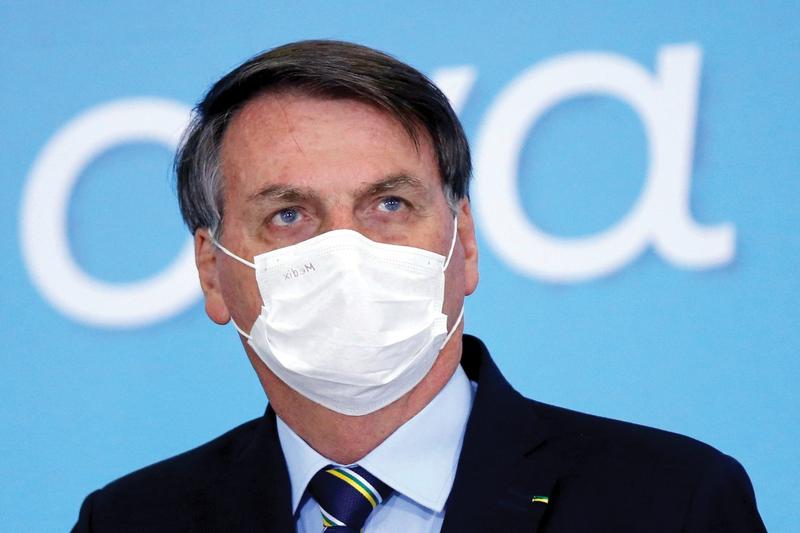Bolsonaro is considered to be in the high-risk group for COVID-19 due to his age
 Brazil’s President Jair Bolsonaro attends the launch of an action plan for the agricultural sector on June 17. (PHOTO PROVIDED TO CHINA DAILY)
Brazil’s President Jair Bolsonaro attends the launch of an action plan for the agricultural sector on June 17. (PHOTO PROVIDED TO CHINA DAILY)
Brazilian President Jair Bolsonaro, who tested positive for the novel coronavirus on July 7, said in a television interview that he was in good health despite running a fever.
In the interview on state-run TV Brasil, Bolsonaro said he began feeling ill over the weekend and has been taking hydroxychloroquine, an antimalarial drug with unproven effectiveness against COVID-19.
“There’s no reason for fear. That’s life,” the president said, wearing a mask, outside his official residence.
The president is considered to be in the high-risk group for COVID-19 due to his age, 65.
Brazil has the world’s second-largest outbreak behind the United States, with more than 1.6 million cases and 65,000 COVID-19 deaths. Globally, cases increased to more than 11.7 million on July 8, while deaths soared above 543,000, according to the Johns Hopkins University in the US.
Bolsonaro joins a short list of heads of government to become infected with the coronavirus, including UK Prime Minister Boris Johnson and Honduran President Juan Orlando Hernandez, both of whom were treated in hospital.
Bolsonaro’s positive test looks set to spark a frantic period of contact tracing and further tests for those who met the politician in recent days, including Paulo Guedes, the economy minister, Luiz Carlos Trabuco, the chairman of Brazilian bank Bradesco, and Francisco Gomes Neto, the CEO of plane-maker Embraer.
Bolsonaro was in close contact over the weekend with Todd Chapman, the US ambassador to Brazil, for Fourth of July celebrations. Pictures showed neither wearing a mask.
The US embassy in Brasilia said the ambassador had lunch with Bolsonaro, five ministers and the president’s son, Eduardo Bolsonaro, a congressman. The ambassador had no symptoms, but would undergo testing and is “taking precautions”.
In a news conference, Mike Ryan, executive director of the World Health Organization’s Health Emergencies Program, said: “We wish him (Bolsonaro) a full and speedy recovery from this disease.”
Marcos Espinal, the Pan American Health Organization director for communicable diseases, echoed Ryan’s sentiments, but said Bolsonaro’s infection carried a message.
“The message is that this virus is unpredictable and does not respect race, class or people in power, despite security around any president,” Espinal said.
“For Brazil, the infection of its president should reinforce the need to strengthen implementations of social distancing recommendations and the use of masks to mitigate the spread of coronavirus.”
Bolsonaro campaigned for continued economic activity and often appeared in public without a face mask and disregarded social distancing.
The president was tested three times in March, following a trip to Washington in which 20 members of his delegation or people he met with later tested positive for COVID-19.
At first he declined to make the test results public, saying only that he had tested negative. Eventually, Brazil’s Supreme Court ruled the results were in the public interest and had to be published.
Sao Paulo’s regional football championship will resume on July 22 as Brazil’s major competitions emerge from their coronavirus shutdowns, state governor Joao Doria told a news conference on July 8.
Sao Paulo has been the worst-affected state, with more than 16,000 COVID-19 fatalities and 341,000 confirmed cases of the virus.
Latin American countries must turn to effective fiscal policy to cushion the social and economic impact of the COVID-19 pandemic and reactivate local economies, the United Nations Economic Commission for Latin America and the Caribbean (ECLAC) said on July 6.
Across the ocean in Brussels, however, reaching swiftly an agreement on an ambitious European recovery package is the European Union’s highest priority for the coming weeks, the bloc’s leaders agreed at a meeting on July 8 with German Chancellor Angela Merkel.
Germany took over the rotating presidency of the Council of the EU on July 1. Charles Michel, Ursula von der Leyen and David Sassoli — the three top officials of the EU — analyzed with Merkel the economic forecasts for the coming months that point to a severe recession and noted that the crisis will have deep social impacts across the bloc.
A readout from the European Union said they stressed that it would be essential that heads of state and government of the EU’s 27 member states reach an agreement on the EU’s long-term budget and recovery plan during next week’s European Council meeting in order to allow further detailed negotiations to start.
The recovery plan envisions 500 billion euros (US$568 billion) in grants to EU member states, largely in southern Europe, that are hit hardest by the pandemic. Fiscally conservative and wealthy northern states have so far been reluctant to greenlight such an important part of the recovery plan.
XINHUA — AGENCIES


